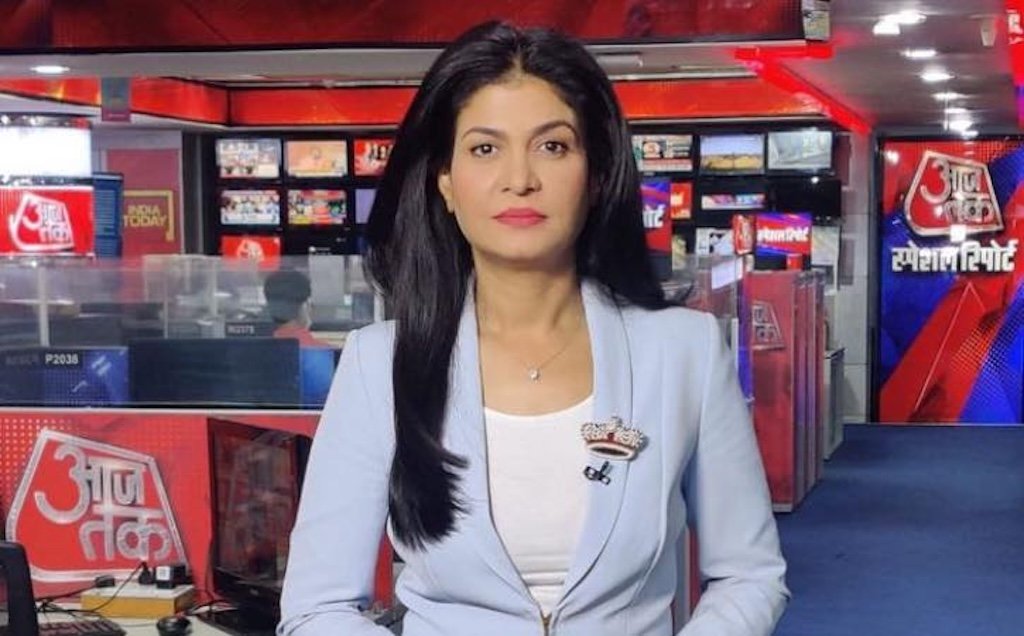The case began when Chaudhary Yashpal, national coordinator of the Bhartiya Valmiki Dharam Samaj (BHAVADHAS), filed a formal complaint against the popular news anchor Anjana Om Kashyap, alleging that her comments during a televised discussion on Aaj Tak “deeply insulted the religious sentiments” of the Valmiki community.
The remarks, which aired on the network’s social media platforms, allegedly contained language deemed “inappropriate” while referring to Maharishi Valmiki, an ancient saint revered by millions. Yashpal’s complaint urged immediate action to “prevent the situation from turning into a law and order issue.”
Following a legal review, Ludhiana Police registered the case on Saturday, naming not just Kashyap but also India Today Group Chairman and Editor-in-Chief Aroon Purie and Living Media India Ltd, the parent company, as co-accused.
“The statements deeply hurt the religious feelings of the Valmiki community,” said Yashpal. “We demand her immediate arrest and a public apology for the words uttered on national television.”
FIR Filed Under New Criminal Laws and SC/ST Act
According to the police report, the FIR invokes Section 299 of the Bharatiya Nyaya Sanhita (BNS) — which penalizes deliberate acts intended to insult religion or religious beliefs — and Section 3(1)(v) of the SC/ST (Prevention of Atrocities) Act, 1989, which criminalizes any act that disrespects revered figures associated with Scheduled Castes or Scheduled Tribes.
FCRF Launches CCLP Program to Train India’s Next Generation of Cyber Law Practitioners
Inspector Gaganpreet Singh, the Station House Officer of Division No. 4 Police Station, confirmed that the file has been forwarded to the Ludhiana Police Commissioner’s office.
“The probe will be handled by a DSP-rank officer as mandated under the SC/ST Act. The file has been sent to the Commissioner for necessary review,” Singh said.
Ludhiana Police Commissioner Swapan Sharma noted that the case was filed after obtaining legal advice and stated that at least 13 Dalit and SC organizations had lodged similar complaints about the program.
“The tone and words used in the show were derogatory and inappropriate,” he added. “The investigation is ongoing.”
Political Angle and Public Reactions
The controversy has taken on political overtones. Vijay Daanav, chief coordinator of BHAVADHAS and an Aam Aadmi Party (AAP) leader who heads the Punjab Government’s Dalit Vikas Board, joined the chorus demanding strict action.
“We want the immediate arrest of Anjana Om Kashyap for insulting Valmiki Ji and hurting our sentiments,” he said in a public statement.
The case has since drawn intense debate online, with some social media users calling for stronger safeguards against “hate speech on national television,” while others caution against “criminalizing opinion” in matters of interpretation or debate.
Legal experts suggest that while the FIR signals a growing readiness to prosecute perceived offenses against marginalized groups, it also highlights the precarious balance between press freedom and social sensitivity in India’s polarized media landscape.
A Broader Reckoning for Media Accountability
The registration of this FIR underscores an increasingly fraught environment for journalists navigating religious sensitivities and public discourse. This is not the first time high-profile television anchors have faced legal action for on-air remarks, but the inclusion of senior media executives in the FIR — including Aroon Purie and Living Media — marks a significant escalation.
Free-speech advocates argue that invoking criminal provisions for televised commentary risks chilling effect on journalism. However, representatives of the Valmiki community assert that such speech, if unchecked, perpetuates “deep-seated disrespect” toward historically marginalized communities.
As the case moves forward, it will test both the newly enacted Bharatiya Nyaya Sanhita and the judiciary’s interpretation of “intent” in religious insult cases — potentially setting an important precedent for how India’s criminal justice system mediates between faith, speech, and accountability in the digital age.



